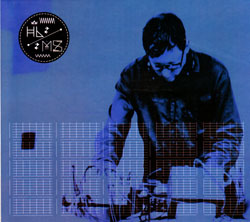
Hanno Leichtmann's not exactly what one would call a prolific fellow; forgetting one sole soundtrack, his prior full-length was released on the Karaoke Kalk label way back in 2006. Minimal Studies is virtually a polar opposite to the fey synthfolk leanings of that earlier recording. Leichtmann apparently chooses to indulge his wide taste in sound art fairly democratically, as his debut here on the always-fascinating Russian label Mikroton attests. In many ways, Mikroton is something of a loner in the great wide electroacoustic landscape; where once such a genre had a proliferation of labels working the analog/digital interface (For 4 Ears, Crouton, Formed, trente oiseaux, Ritornell, Cut, etc.), many have now fallen by the wayside. Mikroton has emerged as the last label of its type standing (begging the pardon of erstwhile, since their own brand of austere soundscaping has carved out an even narrower niche than its Russian cousin); Leichtmann's 'defection' to their ranks says as much about the artist's progressivist agenda as the label's own keen radar for making tactile Leichtmann's vibrant new projections.
And Minimal Studies is indeed an impressive work. It's easy to be taken first with Leichtmann's intuitive sense of tone placement and obvious comfort with both his instruments and his compositional methods. Working with a sparkling array of old-world electronic gear (modular synth system and bass synths, in addition to guitar, ebow, organ, and sampler) and the ubiquitous signal processors that give the music it's hands-on, knob-finessed purple glow, Leichtmann's creations cry out through the speakers fully realized, minus categorical straitjackets, devoid of rigid or preconceived subtext. The sturdy analog waves and resonating pulsations found across "Study Six" and "Study Seven" would have undoubtedly made Robert Moog sit up and take notice, not to mention pricking up the ears of Terry Riley, The Necks, Laurie Anderson, and any number of staunch texturologists.
Bear in mind that Leichtmann's a careful fellow, too. "Minimal" though his approach might be, these works aren't simply studies in sonic economy, arid ideation, or superficial tonality. If anything, Leichtmann's made constructive choices every bit as infused by flavor as appropriate 'placement' in the mix. Though not occupying the same continuum by any stretch (other than a shared love of similar noisemakers), it's not too wayward to think that Tangerine Dream's Edgar Froese could have pursued similar directions had his motivation been driven by purer artistic impulse rather than commercial approbation. As is, Leichtmann's fanciful synthetic capitulations lay bare the slightest familiarizations of most olden-day, hirsute Teutonicists.
Comments and Feedback:
|



